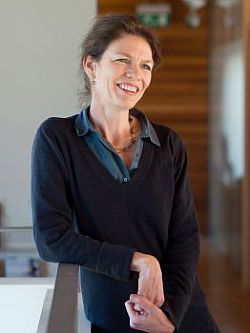IWD 2016: Judith Good - My parents passed on their intellectual curiosity
Dr Judith Good, Reader in Informatics, headed up the University’s Engineering and Informatics Athena SWAN initiative to advance the careers of female scientists.
 Dr Judith Good
Dr Judith Good
I grew up in Michigan in a family of seven children. I’m from a working class background: my parents didn’t attend university, but were constantly reading and learning new things. They passed on their intellectual curiosity, which eventually led me into academia - but not without a few detours along the way.
I didn’t enjoy being a fashion model. I was scouted while living in Belgium, and did magazine shoots and commercial work throughout Europe. I got bored with it after a couple of years though, and went into business selling designer furniture. Eventually, I got bored with that too. Being an academic is the only job that’s held my interest, probably because it’s so varied.
I decided to study psychology after working as a translator for a neuropsychiatrist. I then qualified as a family therapist in my early twenties but, on reflection, I don’t think I had enough life experience to work with extremely complex family dynamics. Around the same time, I discovered I was much more interested in cognitive psychology – and how the brain works – which ultimately led me to study artificial intelligence at the University of Edinburgh.
I’m really interested in how we can use technology to create learning experiences that engage and motivate the greatest number of people. Debates often focus on whether digital technologies are “good” for learning. To me, that’s like asking whether books are good for learning: there are more important questions to ask. A lot of our research has focussed on helping learners develop their own digital technologies, such as computer games. It’s an excellent way to learn such skills as storywriting, graphic design and computer programming – and learners find it highly motivating and engaging.
One of our research projects showed that girls created more sophisticated computer programs than boys. Although articles in the popular press attracted some controversy, there were many positive outcomes, including being invited to give a keynote speech at a major conference on women in IT.
I have a personal interest in designing technology for disability, and feel strongly that such technologies should be co-designed with the people who will ultimately use them. With the Universities of Bath and Southampton, we have created an app that lets people with autism, and their carers and teachers, tell us what technology they would most like to see developed. To me, that’s the right way round.
We have great connections with local disability groups, which is crucial to the success of our research projects. I’ve found these groups to be more than willing to engage with the University as partners in taking research forward.
It’s much easier to be interdisciplinary in my research at Sussex. I never really think about disciplinary boundaries. I collaborate extensively with people across the University, including those in Psychology, Sociology, Education and the Digital Humanities. The really interesting research questions can only be answered by interdisciplinary teams anyway.
When I’m not working, I’m learning metalsmithing techniques for jewellery making. In this age of ever present Health and Safety concerns, it’s refreshing to be let loose with blowtorches and power tools.
